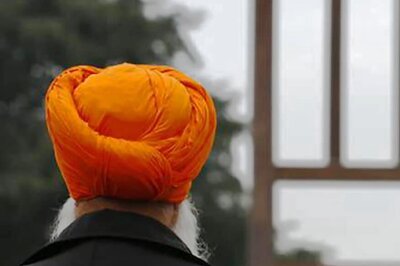'I Knew I Couldn't Stop': With No Money, Food or Clothes, Assam Man Walks Over 350 Kms Amid Lockdown

views
New Delhi: The nationwide lockdown imposed by the government to curb the spread of coronavirus has hampered the lives of many. But for menial workers like Jadav Sinha from Guwahati, the curbs meant walking 350 kilometres back to his village in Assam’s Hailakandi district.
Jadav, in his later thirties, works as a repairer of gas stove and pressure cookers in a small shop in Guwahati’s Ganeshguri market. While he stays at a rented house in the state capital, his wife and two children remain at the small town near Barak Valley.
When the lockdown entered its third day, Jadav had only Rs 1,500 with him. The amount was just enough to pay his monthly rent and send some money back to his wife.
He decided to send Rs 1,000 to his wife and use the rest of his pay for the rent. With no money left, Jadav was worried about his family, which included his elderly father.
Deciding that his stay in the city is futile, with Rs 20 in his pocket and a small knapsack, he walked towards National Highway 37 on April 2 and decided to go back home on foot.
He tells News18 that he tried looking for help from others on his journey, but nothing gave results. With no time and barely enough money, he walked around 80 kilometres till he received a call from a friend telling him that a police jeep would be travelling to Haflong from Guwahati and has consented to take him along.
Hearing the news, Jadav walked back to the city, and by afternoon he was in the police jeep, happy to leave Guwahati and desperate to see his family.
“Somewhere late in the evening the police jeep dropped me in a place called Sonaituli,” he says. “I needed to walk for four hours to reach Haflong railway station.”
But with a limited charge on his phone, he went inside the station to look for a working charging point. A man who he approached warned him that he would call the police if he didn’t leave the property immediately. Scared, he rushed out of the station when he met a railway official.
The officer showed him a tea kiosk in the deep end of the platform, said that it makes tea for the station official and he handed me a bottle of water. “I got myself a biscuit packet at the stall. The five rupees packet was sold for Rs 10 and I was left with no money at all.”
Jadav followed the railway tracks and came across a tunnel. Recalling the event, he says the station official advised him to take the hill road to cross it.
“I could hardly see any road but found the rail track after walking for one and a half hour. Luckily the tunnel was crossed. I kept on walking using my phone’s flashlight as the only source of light. As the night grew upon me, the battery of the mobile was exhausted.”
With no money, food and now no mobile light in the middle of the dense jungle, he says he felt scared but kept on walking. But just before a storm started, he found another tunnel, possibly the sixth one for the night.
With swollen legs and wet clothes, he says he doesn’t remember when he fell asleep in the tunnel. “It was like a trance,” he says, “I saw my children and my wife waiting for me at the gates.”
He woke up abruptly after he felt something cold in his legs. The rains had filled up the tunnel. “I quickly stood up, threw away my shoes and stripped myself naked. I threw away all the heavy clothes from my knapsack and wore a light tee. I started the journey onward in the dark rails. At one point, I could not walk any more. I started crawling on the tracks because I knew I couldn’t stop.“
The railway tracks of Barak valley in south Assam, laid by the British, bisects the dense Borail Range connecting south Assam, Mizoram, Manipur and Tripura. The picturesque rail track, meandering along the Barak River is a 210-km track. It has 79 major bridges, 340 minor bridges and 21 tunnels, the longest tunnel being 3.235 kilometres long and the tallest bridge over the river Doyang is 54 metres tall. However, all these seemed worthless for Jadav, as he had miles to go before he sleeps.
“Breathing heavily, I tried to keep pace, but my legs felt like logs. Soon, it was the dawn of a new day. The morning sun gave me a new zeal to move ahead and the hope that things would be better soon. I kept assuring myself that if I keep walking, I would soon see my kids,” he says.
After he reached the Harangajhao station, locals told him that he needed to walk for the day and by evening I would reach Panchgram, his home.
Failing to describe how he managed to walk more than 48 hours without a morsel, he says “It seemed like an eternity, but by the afternoon of that day, I reached a small station called Hillara.”
The next thing he remembered is the whistle of the pressure cooker in his home, surrounded by his children and his wife. Jadav fainted the moment he reached the gates of his house.
Jadav’s arrival at Panchgram was reported to the Asha workers as he travelled from Guwahati in the lockdown period. He tried explaining to them that he was fit, but he and his family were put for 28 days of home quarantine. While he tried to protest saying that 14 days was good enough, he says he agreed to the rules because it meant keeping his family safe.
As he shares pictures of himself while eating his afternoon meal with his family in quarantine, he says he doesn't know how he made it through but hope nobody goes through the same ordeals as him.
“I wish, even an enemy should not go through this. If you ask me whether I can do it again, my answer would be no. Not even in my wildest dreams.”

















Comments
0 comment